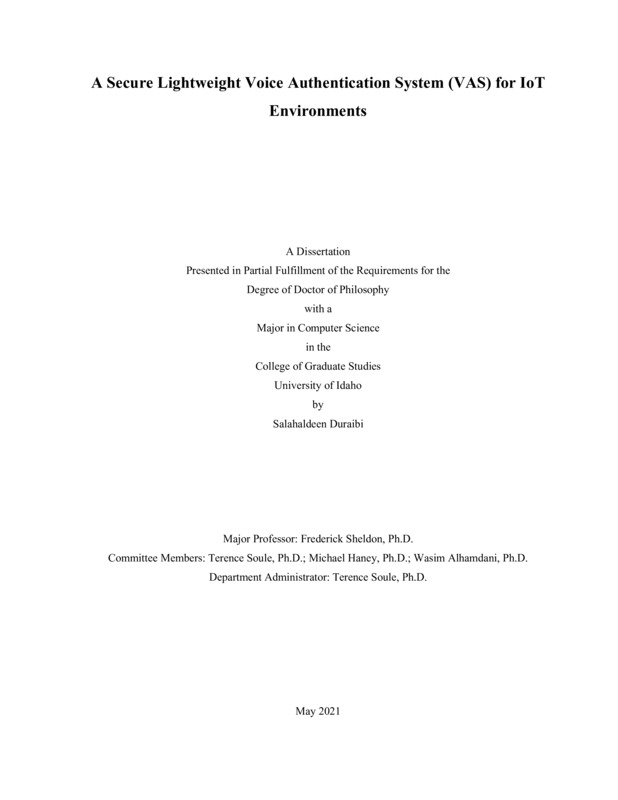A Secure Lightweight Voice Authentication System for IoT Smart Device Users
Duraibi, Salahaldeen. (2021-05). A Secure Lightweight Voice Authentication System for IoT Smart Device Users. Theses and Dissertations Collection, University of Idaho Library Digital Collections. https://www.lib.uidaho.edu/digital/etd/items/duraibi_idaho_0089e_12041.html
- Title:
- A Secure Lightweight Voice Authentication System for IoT Smart Device Users
- Author:
- Duraibi, Salahaldeen
- Date:
- 2021-05
- Program:
- Computer Science
- Subject Category:
- Computer science
- Abstract:
-
The Internet of Things (IoT) provides everyday devices ways of identification and communication with other devices and with their users. The users can be human beings or other devices. The spectrum of IoT applications is very large and includes wearables such as body-area-network-devices and smartwatches. Other IoT application domains include smart homes, smart cities, e-health, etc. IoT devices have the capabilities for collecting information about surroundings, analyzing, and making decisions without user intervention. Security in IoT environments is an optimal requirement. Particularly, authentication is of high interest given the damage that can be caused by unauthorized adversarial access to such devices. This dissertation proposes a biometric based authentication model that can be used in IoT devices. In the first part of the dissertation, the background study, different biometrics used for authentication are compared for their suitability in IoT devices. Subsequently, considering the resource-constrained nature of IoT devices, a voice biometrics was selected as compared to other biometrics, such as fingerprint, iris scan, keystrokes, etc., which need dedicated hardware devices to be used in IoT ecosystems. In the second part of the dissertation, deep learning approaches that extract and classify features to detect voice spoofing attacks were studied. These approaches are based on a convolutional neural network and a deep neural network. The convolutional neural network approach was used as a feature extractor, while the deep neural network approach was used as a classifier. In addition, hybrid features that consist of Mel frequency Cepstral Coefficients (MFCC) and Constant Q Cepstral Coefficients (CQCC) features were used to train both approaches. Compared to state-of-the-art approaches, both approaches improved the state of detecting spoof replay attacks in speaker verification. Finally, enticed by the results of the two approaches, a voice-based authentication system that can be used in IoT devices was developed. Subsequently, the system was employed in an experiment that used virtualized IoT devices. The authentication system has shown increased accuracy.
- Description:
- doctoral, Ph.D., Computer Science -- University of Idaho - College of Graduate Studies, 2021-05
- Major Professor:
- Sheldon, Frederick
- Committee:
- Soule, Terence; Haney, Michael; Alhamdani, Wasim
- Defense Date:
- 2021-05
- Identifier:
- Duraibi_idaho_0089E_12041
- Type:
- Text
- Format Original:
- Format:
- application/pdf
- Rights:
- In Copyright - Educational Use Permitted. For more information, please contact University of Idaho Library Special Collections and Archives Department at libspec@uidaho.edu.
- Standardized Rights:
- http://rightsstatements.org/vocab/InC-EDU/1.0/

